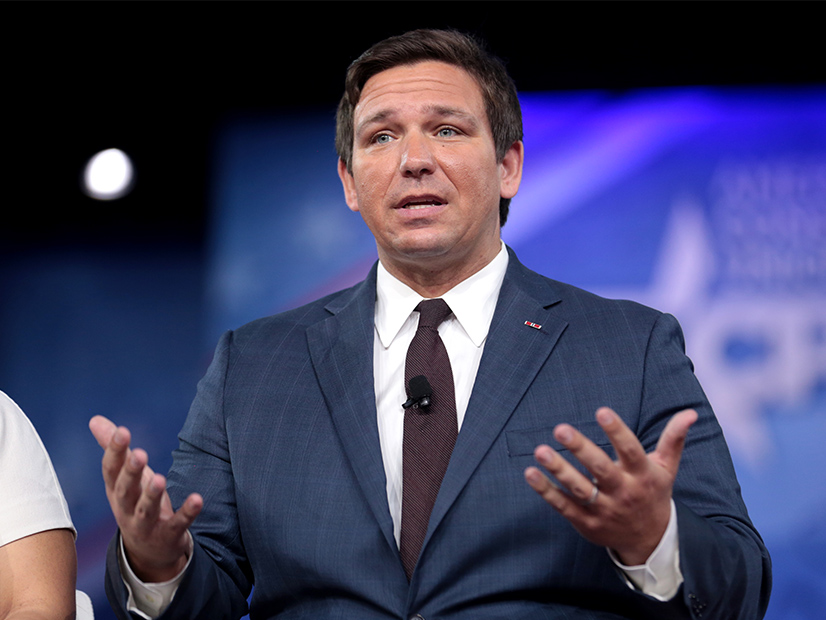Florida Gov. Ron DeSantis (R) looks to be ramping up his 2024 presidential campaign by rejecting a growing list of federal and state clean energy initiatives.
Last month, the governor used a line-item veto to turn down a $5 million federal grant that would have allowed Florida to hire and train staff to administer $346 million from the Inflation Reduction Act. The money would have provided rebates to consumers for a range of energy-efficient home upgrades, according to a report from Bloomberg News.
The line-item veto was part of a package of funding cuts DeSantis made in the state budget on June 15. In letters sent to the U.S. Department of Energy on June 19, Brooks Rumenik, executive director of the Florida Department of Agriculture and Consumer Services’ Office of Energy, said the state was “respectfully” withdrawing its applications for the grants, as reported by The Capitolist, a website covering Florida news and politics.
Earlier this month, DeSantis vetoed a bill (SB 284) that would have triggered widespread electrification of vehicles owned by state and local government agencies. The bill, which passed both houses in the Florida Legislature with overwhelming bipartisan support, would have required state and local governments to base vehicle purchases on overall cost of ownership rather than fuel efficiency, as reported by the Orlando Sentinel.
While electric vehicles are more expensive to purchase, their costs for fuel and maintenance are lower than gas-powered cars. Savings from electrifying state and local government fleets were projected to be $277 million, according to estimates from Advanced Energy United.
DeSantis’ critics framed both actions as purely political, criticizing the governor for putting his presidential ambitions ahead of the state’s consumers, who are currently under an extreme heat watch.
The rejected energy efficiency funding would “directly benefit homeowners and renters, and these rebates mean that people in Florida would get lower utility [bills] and healthier and more comfortable homes, as well as lower greenhouse gas emissions,” said Lowell Ungar, director of federal policy for the American Council for an Energy-Efficient Economy.
With the SB 284 veto, DeSantis was playing to Iowa voters, said state Rep. Anna Eskamani (D). “The Iowa caucus voters who are all about ethanol don’t see electric vehicles as something that is economically in their favor,” Eskamani told the Sentinel. “DeSantis is catering to his Iowa voters, not passing policy for Floridians.”
The governor’s veto caught many by surprise because of the wide support the bill had from Republicans and the Florida Natural Gas Association.
“It was a common sense, good governance bill. There is nothing in this bill that any person in America should be against,” former state Sen. Jeff Brandes (R) told the Sentinel. However, no efforts have been made to overturn the veto, the Sentinel reported.
Campaign Narratives
DeSantis’ vetoes could play into President Joe Biden’s current effort to shape the campaign narrative by promoting the economic benefits the IRA has brought to Southern states, whose lawmakers voted against the law.
Visiting South Carolina on July 6, Biden noted that since the passage of the IRA, clean energy companies had brought $11 billion in new investment to the state. Inverter manufacturer Enphase Energy is putting $60 million into two new manufacturing lines in the state, and Redwood Materials, a battery recycling company, is investing $3.5 billion in a new plant to be located near Charleston, Biden said.
A White House fact sheet quoted the state’s Republican lawmakers hailing the new investments in clean energy manufacturing, even though they voted against the IRA.
South Carolina and Georgia have drawn the most new clean energy business, according to the American Clean Power Association (ACP), with solar and battery manufacturers flocking to the states. An ACP map tracking new clean energy investments identifies only two in Florida, both expansions of existing facilities. Jinko Solar is expanding a photovoltaic plant in Jacksonville, and General Electric is investing $20 million to build out a plant where it is manufacturing onshore wind turbines.


